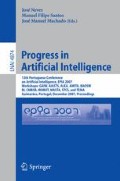Abstract
This paper shows how moral decisions can be drawn computationally by using prospective logic programs. These are employed to model moral dilemmas, as they are able to prospectively look ahead at the consequences of hypothetical moral judgments. With this knowledge of consequences, moral rules are then used to decide the appropriate moral judgments. The whole moral reasoning is achieved via a priori constraints and a posteriori preferences on abductive stable models, two features available in prospective logic programming. In this work we model various moral dilemmas taken from the classic trolley problem and employ the principle of double effect as the moral rule. Our experiments show that preferred moral decisions, i.e. those following the principle of double effect, are successfully delivered.
Access this chapter
Tax calculation will be finalised at checkout
Purchases are for personal use only
Preview
Unable to display preview. Download preview PDF.
References
Alferes, J.J., Brogi, A., Leite, J.A., Pereira, L.M.: Evolving logic programs. In: Flesca, S., Greco, S., Leone, N., Ianni, G. (eds.) JELIA 2002. LNCS (LNAI), vol. 2424, pp. 50–61. Springer, Heidelberg (2002)
Anderson, M., Anderson, S., Armen, C.: MedEthEx: A prototype medical ethics advisor. In: IAAI 2006. Procs. 18th Conf. on Innovative Applications of Artificial Intelligence (2006)
Bringsjord, S., Arkoudas, K., Bello, P.: Toward a general logicist methodology for engineering ethically correct robots. IEEE Intelligent Systems 21(4), 38–44 (2006)
de Waal, F.: Primates and Philosophers, How Morality Evolved. Princeton U. P. (2006)
Dell’Acqua, P., Pereira, L.M.: Preferential theory revision. In: Pereira, L.M., Wheeler, G. (eds.) Procs. Computational Models of Scientific Reasoning and Applications, pp. 69–84 (2005)
Dell’Acqua, P., Pereira, L.M.: Preferential theory revision (extended version). Journal of Applied Logic (to appear, 2007)
Foot, P.: The problem of abortion and the doctrine of double effect. Oxford Review 5, 5–15 (1967)
Gelfond, M., Lifschitz, V.: The stable model semantics for logic programming. In: Kowalski, R., Bowen, K.A. (eds.) 5th Intl. Logic Programming Conf., MIT Press, Cambridge (1988)
Gigerenzer, G., Engel, C. (eds.): Heuristics and the Law. MIT Press, Cambridge (2006)
Guarini, M.: Particularism and generalism: how AI can help us to better understand moral cognition. In: Anderson, M., Anderson, S., Armen, C. (eds.) Machine ethics: Papers from the AAAI Fall Symposium, AAAI Press, Stanford, California, USA (2005)
Hauser, M.D.: Moral Minds, How Nature Designed Our Universal Sense of Right and Wrong. Little Brown, Boston – USA (2007)
Joyce, R.: The Evolution of Morality. MIT Press, Cambridge (2006)
Kakas, A., Kowalski, R., Toni, F.: The role of abduction in logic programming. In: Gabbay, D., Hogger, C., Robinson, J. (eds.) Handbook of Logic in Artificial Intelligence and Logic Programming, vol. 5, pp. 235–324. Oxford University Press, Oxford (1998)
Katz, L.D. (ed.): Evolutionary Origins of Morality, Cross-Disciplinary Perspectives. Imprint Academic (2002)
Kowalski, R.: The logical way to be artificially intelligent. In: Toni, F., Torroni, P. (eds.) Procs. of CLIMA VI. LNCS (LNAI), p. 122. Springer, Heidelberg (2006)
Lopes, G., Pereira, L.M.: Prospective logic programming with ACORDA. In: Procs. of the FLoC 2006, Workshop on Empirically Successful Computerized Reasoning, 3rd Intl. J. Conf. on Automated Reasoning (2006)
McLaren, B.M.: Computational models of ethical reasoning: Challenges, initial steps, and future directions. IEEE Intelligent Systems 21(4), 29–37 (2006)
Mikhail, J.: Universal moral grammar: Theory, evidence, and the future. Trends in Cognitive Sciences 11(4), 143–152 (2007)
Pereira, L.M., Lopes, G.: Prospective logic agents. In: Neves, J.M., Santos, M.F., Machado, J.M. (eds.) EPIA 2007. Procs. 13th Portuguese Intl.Conf. on Artificial Intelligence. LNCS (LNAI), Springer, Heidelberg (2007)
Pereira, L.M., Saptawijaya, A.: Moral decision making with ACORDA. In: Dershowitz, N., Voronkov, A. (eds.) LPAR 2007. Short papers call, Local Procs. 14th Intl. Conf. on Logic for Programming Artificial Intelligence and Reasoning (2007)
Powers, T.M.: Prospects for a Kantian machine. IEEE Intelligent Systems 21(4), 46–51 (2006)
Rzepka, R., Araki, K.: What could statistics do for ethics? The idea of a commonsense-processing-based safety valve. In: Anderson, M., Anderson, S., Armen, C. (eds.) Machine ethics: Papers from the AAAI Fall Symposium, AAAI Press, Stanford, California, USA (2005)
Tancredi, L.: Hardwired Behavior, What Neuroscience Reveals about Morality. Cambridge University Press, Cambridge (2005)
Author information
Authors and Affiliations
Editor information
Rights and permissions
Copyright information
© 2007 Springer-Verlag Berlin Heidelberg
About this paper
Cite this paper
Pereira, L.M., Saptawijaya, A. (2007). Modelling Morality with Prospective Logic. In: Neves, J., Santos, M.F., Machado, J.M. (eds) Progress in Artificial Intelligence. EPIA 2007. Lecture Notes in Computer Science(), vol 4874. Springer, Berlin, Heidelberg. https://doi.org/10.1007/978-3-540-77002-2_9
Download citation
DOI: https://doi.org/10.1007/978-3-540-77002-2_9
Publisher Name: Springer, Berlin, Heidelberg
Print ISBN: 978-3-540-77000-8
Online ISBN: 978-3-540-77002-2
eBook Packages: Computer ScienceComputer Science (R0)

